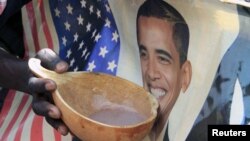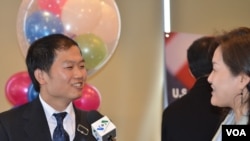NAIROBI —
Africans around the continent have joyously welcomed the re-election of U.S. President Barack Obama, a man many have hailed as a “son of Africa.” But there are others who have cooled to the president for not doing enough for Africa during his first term in office.
In spite of that, no matter what political battles he fights at home, the president always can count on support from Kenya.
His father’s homeland has always taken particular pride in the U.S. president, and the citizens of the country consider him one of their own.
Watch related video of reaction in Kenya
Watching second term
On the streets of Nairobi, accountant Joseph Koech said he stayed up all night to watch the U.S. vote count that would give Obama a second term.
“We are so happy about Obama's winning this election. As his biological father is a Kenyan, we are happy as Kenyans as a whole," said Koech. "We are so happy tonight, all throughout, we are watching what is going on there and we are so happy.”
In a congratulatory message, Kenyan President Mwai Kibaki said “Kenya, as always, is proud of our association with you.”
But in other countries, the response to Obama’s re-election was more measured.
Voicing concerns
While most people who spoke to VOA said they would, without a doubt, have voted for Obama over his opponent Mitt Romney, many felt the president had neglected Africa during his first four years.
In Blantyre, Malawi, radio journalist Innocent Mphogolo said he expects more from Obama in his second term.
“So this time around I think it’s a call to him, or it’s our wish as Africans that maybe he can assist Africa as much so maybe we can see a bit of improvement in the welfare of Africans," said Mphogolo.
Indeed, Obama only traveled to Africa once during his first term - a trip to Ghana in July 2009 that lasted a bit less than 24 hours. In his speech to the parliament in Accra during his visit, Obama called on Africans to take charge of their own destiny.
"Africa doesn’t need strongmen,” he said “it needs strong institutions,” said Obama.
Vowing partnership
He also promised the U.S. would be a strong partner to the continent.
But looking back at his time in office, Senegalese university student Pathe Diouf said he is tired of the U.S. president, who he said has been all talk and no action.
"I've lost hope in Obama,” he said. “He hasn't done much for Africa these past four years. American presidents just make speeches. I've had enough of speeches. I want Obama to do something concrete. Life is hard in Africa, even though Africans get by as best they can.”
U.S. policy for Africa was barely discussed during this year’s presidential campaign, except for a fleeting mention of Islamic extremism in Somalia and Mali during a debate on foreign policy. The scant attention paid to Africa has left some on the continent feeling abandoned, especially by a president with African roots.
Watch related video of reaction in Nigeria
Extending congratulations
Flora Jingla, at the University of Douala, Cameroon was more forgiving. She said she understands that America is not like Cameroon or like Africa as a whole, it has its own problems, and that Obama has to take care of his own country first.
“I don’t have to be evaluating Obama if he’s done enough for Africa. I have to find out first if he’s done enough first for the country where he is the president and not as if he is an African. The Americans know they are voting their president and not an African president," said Jingla.
A host of African leaders sent messages of congratulations to Obama, including South Africa’s Jacob Zuma, Nigeria’s Goodluck Jonathan and Egypt’s Mohamed Morsi, all of whom expressed the hope that ties between their countries and the United States will be strengthened.
Anne Look in Dakar, Ntaryike Divine in Douala, Lameck Masina in Blantyre, and Anita Powell in Johannesburg contributed to this report.
In spite of that, no matter what political battles he fights at home, the president always can count on support from Kenya.
His father’s homeland has always taken particular pride in the U.S. president, and the citizens of the country consider him one of their own.
Watch related video of reaction in Kenya
Watching second term
On the streets of Nairobi, accountant Joseph Koech said he stayed up all night to watch the U.S. vote count that would give Obama a second term.
“We are so happy about Obama's winning this election. As his biological father is a Kenyan, we are happy as Kenyans as a whole," said Koech. "We are so happy tonight, all throughout, we are watching what is going on there and we are so happy.”
In a congratulatory message, Kenyan President Mwai Kibaki said “Kenya, as always, is proud of our association with you.”
But in other countries, the response to Obama’s re-election was more measured.
Voicing concerns
While most people who spoke to VOA said they would, without a doubt, have voted for Obama over his opponent Mitt Romney, many felt the president had neglected Africa during his first four years.
In Blantyre, Malawi, radio journalist Innocent Mphogolo said he expects more from Obama in his second term.
“So this time around I think it’s a call to him, or it’s our wish as Africans that maybe he can assist Africa as much so maybe we can see a bit of improvement in the welfare of Africans," said Mphogolo.
Indeed, Obama only traveled to Africa once during his first term - a trip to Ghana in July 2009 that lasted a bit less than 24 hours. In his speech to the parliament in Accra during his visit, Obama called on Africans to take charge of their own destiny.
"Africa doesn’t need strongmen,” he said “it needs strong institutions,” said Obama.
Vowing partnership
He also promised the U.S. would be a strong partner to the continent.
But looking back at his time in office, Senegalese university student Pathe Diouf said he is tired of the U.S. president, who he said has been all talk and no action.
"I've lost hope in Obama,” he said. “He hasn't done much for Africa these past four years. American presidents just make speeches. I've had enough of speeches. I want Obama to do something concrete. Life is hard in Africa, even though Africans get by as best they can.”
U.S. policy for Africa was barely discussed during this year’s presidential campaign, except for a fleeting mention of Islamic extremism in Somalia and Mali during a debate on foreign policy. The scant attention paid to Africa has left some on the continent feeling abandoned, especially by a president with African roots.
Watch related video of reaction in Nigeria
Extending congratulations
Flora Jingla, at the University of Douala, Cameroon was more forgiving. She said she understands that America is not like Cameroon or like Africa as a whole, it has its own problems, and that Obama has to take care of his own country first.
“I don’t have to be evaluating Obama if he’s done enough for Africa. I have to find out first if he’s done enough first for the country where he is the president and not as if he is an African. The Americans know they are voting their president and not an African president," said Jingla.
A host of African leaders sent messages of congratulations to Obama, including South Africa’s Jacob Zuma, Nigeria’s Goodluck Jonathan and Egypt’s Mohamed Morsi, all of whom expressed the hope that ties between their countries and the United States will be strengthened.
Anne Look in Dakar, Ntaryike Divine in Douala, Lameck Masina in Blantyre, and Anita Powell in Johannesburg contributed to this report.







